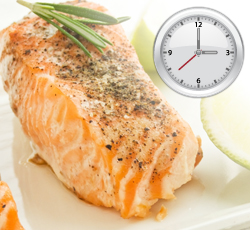The best distribution of carbohydrate, protein, and fats to optimize performance, improve body composition and achieve a desirable target weight is up for debate. One important factor however is Nutrient Timing - how your body responds to the amount of calories you are feeding it throughout the day.
Say for instance, your metabolic rate at rest is a mere 1800 calories, but you consume all of those calories in only two meals, you will be consuming a whopping 900 calories in one meal. If this does not sound like a lot to you, maybe we should take a look at caloric content of foods. This is a ridiculous amount of calories to consume in one sitting and will only result in the excess being stored as fat. Your body will use only what it needs at that time, and will store the excess in the form of ‘cottage cheese’ on your back side.
So, let’s continue with our example of a body that requires 1800 calories that to function normally at rest. Let’s say that you want to lose weight. To do this you need to create a caloric deficit, whether from exercise or restricting your caloric intake. If you decrease your caloric intake (foods you consume) by an extreme amount without evenly distributing the macronutrient profiles and refraining from physical activity, you will lose weight. BUT, and that is a big but (pun intended), you are not only decreasing your fat mass, you are losing lean mass as well (in the form of muscle). It is extremely important to maintain muscle because it is the only metabolically active mass contained in the human body, as fat does not require calories to exist. Muscle, however, requires fuel (calories) to avoid muscle catabolism (muscle loss). The less muscle you have, the fewer calories your body needs to function properly. Reducing your daily caloric intake will result in muscle and fat loss thus resulting in a lower metabolic rate. No longer will you require 1800 calories per day, instead, your body may only need a measly 1200 calories per day. This might seem like a good thing but, if you have reduced your calories from 1800 to 1500 to get to that point, and now your body only needs 1200 calories, you will gain weight, guaranteed. Not only that, but your body composition has reduced in muscle mass and increased in fat mass – you are now fatter than you were before even though your jeans are loose.
In any case, the ideal situation would be to supply your body with fuel at various times throughout the day. When your parents were young people they probably consumed three meals per day with a small snack (tea time) between meals. The obesity rate in America is higher today than ever before; maybe taking the time for a small snack between meals is not such a bad idea.
Here is another great example to help you better understand the scenario at hand, if you are taking a trip in your car that requires 45 gallons of gasoline in total, and your gas tank is only large enough to hold 15 gallons at one time, you need to refill your tank three times to reach your destination. Either way you still need a total of 45 gallons, so if you were to fill your tank with 45 gallons at once, this obviously would not work unless you increase the size of your gas tank to do so. So, filling up three times throughout your trip makes more sense. This is the same for your body. Again, let’s go back to the example of a body that requires 1800 calories to function properly. If you consume the entire 1800 calories in one sitting, your body cannot utilize this amount of calories at that time and it will have to increase the tank size, in the form of stored fat for use as energy at a later time. Splitting the 1800 calories into five or six small meals throughout the day is a much better way for your body to utilize the energy instead of storing it as fat.
Here is a sample of meal timing (planning):
*for an 1800 calorie diet split into 6 small meals
Meal #1: 7 a.m. – 500 calories total
Meal #2: 9:30 a.m. – 200 calories total
Meal #3: 12:00 Noon – 400 calories total
Meal #4: 2:30 p.m. – 200 calories total
Meal #5: 5:00 p.m. – 300 calories total
Meal #6: 7:30 p.m. – 200 calories total
*This is just an example; caloric distribution can be manipulated in many ways, with breakfast and post-workout meals being of the highest caloric content for the day.
We live in a busy world, and it's easy to find excuses not to eat as often as we should. If you always find yourself skipping a meal because you didn't have the time to prepare, then you can benefit by incorporating supplements into your regular routine. A convenient, ready-to-drink protein shake such as Protein Rush® or a delicious low-calorie Life Lift™ Bar are excellent options that can redefine the way you fuel your body!
Good luck and happy eating!!!







